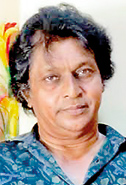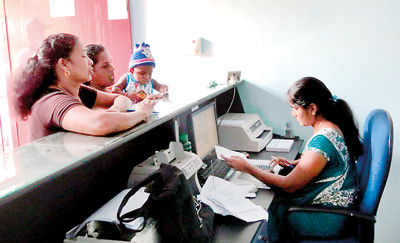A fishing community’s prize catch
November 28 was a day of celebration for the villagers of Munnakkaraya, a fishing village in Negombo, as two of their own crossed the ocean to receive on their behalf the Help for Self- Help Award presented by the Stromme Foundation of Norway.
Among the past recipients of this honour have been Nobel Prize winner Dr. Muhammad Yunus of Bangladesh, Durga Ghimire of Nepal, and Bishop Paride Taban of Sudan. The village of Munnakkaraya was bestowed the Help for Self- Help Award for their commitment and community spirit in working towards independence and empowerment.

Bernard Stanley: First president of the Munnakkaraya Thrift and Credit Co- Operative Society
The award citation read: “Munnakkaraya Thrift and Credit Cooperative Society receiving the award this year recognises an extraordinary civil society group that has empowered a community and lifted them out of poverty.” The Munnakkaraya Cooperative Society, begun in 1985 has seen sustained growth long years after support from the initial funding agency and implementing agency ended. The project was initiated and funded by Stromme Foundation and implemented with assistance from the organisation, Mary’s Friends of Norway.
Consultant to The Foundation Naseer Mohammed recalling its beginnings said he and a few others were determined to break the vicious cycle of poverty the villagers were trapped in, completely in the grip of local loan sharks who charged exorbitant interest rates. No bank would grant loans to this community given the risks of them being unable to repay. The Stromme Foundation helped set up small groups of five in which people saved money together. This proved to be the roots of the Munnakkaraya Thrift and Credit Co- Operative Society.
“There is a belief that fishermen cannot save. I think through the society we managed to change this idea,” the first president of the Society, Bernard Stanley told the Sunday Times. “Initially we used to save as little as five rupees. The total collection was about Rs 65,000. My first loan was just 500 rupees which I used to buy fishing nets,” he said.
As time went on, these little groups managed to save enough to lend money among them. Once people had a taste of how advantageous saving could be, the small groups were assimilated into one co-operative society. Today, the Munnakkarya Sanasa Committee that began with 94 members in 1987 has grown to 1760 members and amazingly 95 percent of the membership consists of women.
The birth of this life-changing idea began in Norway when a Rev. Stromme, along with several members of the Church initiated a group called “Mary’s Friends”, dedicated to serving the community. Having been involved in community work here in Sri Lanka as well, the society attracted several local youths, among them Nimal Martinus. Coincidentally in Negombo, Sister Rosary an Irish nun who had dedicated her life to the rehabilitation of delinquent girls was conducting a sanitation project in the Munnakkaraya area.
The group realised that though the area was rich in fishing resources the fisherfolk were living in dire poverty, under the iron thumb of money lenders and more established fisherman who monopolised the trade. Nimal was keen to help organised groups within the village where their problems could be openly discussed and resolved. Slowly the group “Mary’s Friends” joined forces with the community leading to the birth of the Munna-kkaraya project.

Women leading the way: Paying back loans at the co-operative society
“At that time women did not come out of their homes. Society was too dangerous. Men would get drunk and create problems in their family. The children also missed school,” said Sujatha Fernando, a member of the Munnakkaraya Thrift and Credit Co-operative Society, adding that in these difficult circumstances, women were compelled to save discreetly. Faced with the prospect of coming back home to irate husbands and leaving household chores undone, women rarely came for meetings. “We had a daunting task in educating them on the reasons for poverty in this village. We went from one home to another stressing to women how important society meetings were.” At the risk of being harassed by the men, they continued one doorstep to another encouraging the women of the society to join.
The fisherfolk had little idea of personal hygiene or nutrition and they did their bit to improve awareness on good health and sanitation habits. “We explained to mothers that children fell sick because of the lack of proper toilets. The situation was so bad that people were using the lagoon as a toilet.”
The Stromme Foundation also set up pre-schools in the village, and just like the co-operative society this too is now a community effort. A volunteer worker at the pre-school, Ranmalee Fernando said, “Many didn’t quite know what a pre-school was like.”
Being trained by the Foundation to teach and also having gone through other training offered by the Fisheries Ministry Ranmalee says she took part in awareness campaigns such as promoting health. “We were taught how to analyse a problem and find solutions, of the values we required and even the exercise of patience and tolerance. It is because of this that we were able to survive this long and these values are still with us.”
These values of equality and fairness in the community have stood strong. “Leadership is raised from the members of the society and no bias or favour is shown. The AGM ensures that the leadership reflects the views of the majority. Though a steering committee is present control is vested in the membership,” she says.
Ranmalee believes that although officers from Stromme helped set it up, it was the people of the village that strengthened the society. “Just like how these buildings were put up and completed the village too has been built up from the ground.” Reflecting on the integrity and commitment of their founders she says, “Honesty is also important for civil society. It is because of everyone’s honesty and dedication to the development that it has been a success.”



